
 

Power, Politics, Positionings -
Women in Northern Ireland
Painting the Picture
Kate Fearon
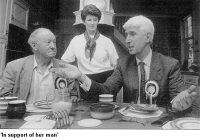
Most of the parties which have been
involved in the negotiations at Stormont are defined solely in
terms of their relationship with the union - whether they favour
its defence, its dilution or its disbandment. But people cannot
survive on the state of the union alone.
So what do the parties say about issues of particular relevance
to women, inside and outside their organisations? And how did
women in the parties fare in the election in May to the Northern
Ireland Forum?
Fig 1 shows the number of women on the executive bodies of the
Northern Ireland parties (excluding the Democratic Unionist party
and the UK Unionist party, which failed to respond to requests
for information).
All the parties said that women organised autonomously within
them, via 'women's groups' or 'women's forums'. But the role such
a body plays varied slightly: in some parties it is a lobbying
group, with an agenda for increasing the profile of women in the
party; in others it is a space for women to discuss issues they
identify as important. None, however, appears to have a direct
input to policy formation, though their members may sit on policy-making
bodies.
Broadly speaking, the parties also favour childcare in some form.
The Ulster Unionist party, while supporting provision at educational
institutions and in the workplace - including tax concessions for
employers as an incentive -fails to provide childcare at its annual
conference. Alliance takes a similarly equivocal stance. It has
adopted the United Nations Convention on the Rights of the Child,
providing for a child-centred approach to welfare, but it no longer
provides childcare at conference - due to 'lack of demand'. The
Social Democratic and Labour party does offer conference childcare,
and claims repeatedly to have lobbied government for a statutory
right to nursery education for all.
Figure 1: party executives and women executive members
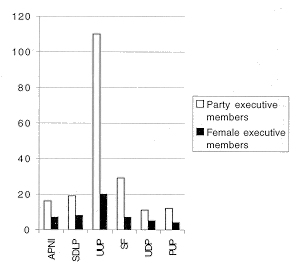
Sinn Féin has provided childcare at its ard fheis (conference)
since 1982. It is party policy to have similar provision at all
meetings of SF, regardless of level or frequency. Externally,
it supports a wide-ranging policy, including workplace childcare
and free nursery education. The Progressive Unionist party also
provides childcare at its annual policy-making meeting. It supports
workplace crèches to help working mothers and single parents
take up employment. The Ulster Democratic party believes childcare
is very important, and also plans to introduce a crèche
at its conference.
On some human rights issues the parties take more divergent positions.
As regards abortion, for instance, the UUP and the DUP are opposed
in any circumstances, but the SDLP, while opposed to the extension
of the 1967 Abortion Act from Britain, does recognise the "deeprooted
social and economic reasons for abortion and the need to address
these issues". Alliance doesn't have policy on abortion:
there is no party whip on matters deemed to be of private morality.
The PUP supports a woman's right to choose and acknowledges an
individual's right to control one's own body, irrespective of
marital status; it calls for extension of the 1967 act. While
not endorsing extension, SF policy replicates the wording of the
UK legislation, supporting the need for abortion where there is
a threat to the mental or physical health of women, and in cases
of rape or sexual abuse. SF also supports non-directive counselling
and advice on all choices made by women. The UDP has no formal
policy on the matter, but the party leader has confirmed that
there would be circumstances in which abortion was a necessary
option.
Both the SDLP and SF argue for a redefinition of what constitutes
rape. The SDLP believes the crime should be redefined to cover
a cover a number of attacks currently bracketed under the 'lesser'
offence of indecent assault. It also calls for objective assessment
of the victim's consent to a sexual act, based on the judgment
of a "reasonably minded person" - the current position
is that a man has a defence if he can convincingly say he believed
the woman consented. SF is very specific as to the type of activity
it wants defined as rape: intimidation with threats or weapons,
beating, choking, knifing, sexual and mental humiliation, forced
oral sex and use of weapons to penetrate women. Neither the UUP
nor the UDP has specific policy on rape and sexual assault. The
PUP calls for a strengthening of the law in relation to rape
and all forms of sexual assault and is woman-oriented insofar
as it supports more services for victims.
It adopts a similar approach in its domestic violence policy -
a strengthening of the law, and more services for women. The UUP
does have policy on domestic violence, focusing on post-abuse
care: simplification of arrest, charge and prosecution procedures.
Like the SDLP, it calls for increased funding for victim support,
rehabilitation and refuges. The UDP takes a slightly different
perspective, looking to what happens before cases reach the police
or courts, if ever. It feels strongly that women and men should
be involved in combating domestic violence, though it does not
specify how this might be done. While Alliance has no policy on
domestic violence, SF has a very detailed policy, which locates
the issue in the wider political framework. Again support structures
feature, along with, like the UUP, reform of the police and court
services. But it further recognises difficulties in those areas
where prompt police action may not be an option for women. It
does not expressly advise women not to go to the police for help
but, if women do fear this option, uniquely among the parties
it reports that it will conduct referrals to statutory agencies,
other women and "community support services".
All the parties recognise that the
status and visibility of women in their party is, if not cause
for concern then cause at least for some activity to address it.
Some are more conscious of the journey yet to travel than others.
Alliance is consulting women in the party informally, and will
encourage more to stand in elections. It notes that over one third
of its council candidates in 1993 were women (there are 12 female
Alliance councillors), but it has no plans for positive discrimination.
The SDLP has also set in place "structures to improve the
visibility of women in the party at public levels". The issue
of promoting visibility without concomitant status concerns SF
internally Often, it says, women can have visibility, and no status:
it is important to have status to prioritise internal positioning
and decision-making positions for women. It believes that it has
gone some way down the road, but admits there is still a major
way to go. The UUP is more upfront and states quite simply that
women's position in the party should be enhanced, as should the
roles they assume in the party.
Given that the parties recoguise that there are numerical and
positional problems facing women in their own parties, what mechanisms,
if any, do they employ to redress the imbalance?
Figure 2: total party candidates and female runners in 1996
Northern Ireland elections
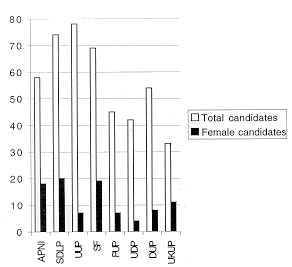
Policies on equal opportunities tend to be housed in two strands,
which can be mutually inclusive. They look into party structure
or outward to society in general. Alliance is committed to full
equality of opportunity and opposes all forms of discrimination
on grounds of gender, religion, disability and so on. It has no
special measures to oppose gender discrimination in its own party,
unlike the SDLP, SF and the PUP, who operate quotas for women
on their executive bodies. The SDLP also demonstrates an appreciation
of the wider issues, supporting affirmative action programmes
to promote education, training and recruitment of women into areas
of employment previously closed to them. It further advocates
training courses aimed at young unemployed women, and more flexible
working arrangements. The PUP shares this appreciation, focusing
its childcare policy on women's employment or return-to-work opportunities.
SF expands the policy further, looking to secure equality of opportunity
in health and education. It too has quotas for women on the national
executive and on all committees.
The UDP is more concerned purely with its party structures, seeking
to attain equal members of women in the party The UUP has no explicit
provision for quotas, though effectively its Women's Council'
provides for a limited recognition of this principle, even if
it does not provide for its application. The party's equal opportunities
policy is not concerned with its internal structures. Rather,
it looks out to public agencies and 'monitoring' of the Equal
Opportunities Commission and the Fair Employment Commission.
All the parties, with the exception of the UUP, additionally offer
training to women in public speaking. Thus all the parties recognise,
to varying degrees, that some gender-specific measures are necessary
to increase the status and visibility of women in their parties,
and at least some of them go some way to addressing this reality
This tentative understanding is not carried forward to selection
methods, however. All special measures for women fall off at Westminster
level. Alliance claims that "many and varied skills"
are required for the prospective Westminster candidate, and holds
open competitions by election in both constituency and council
selection meetings. The SDLP, too, favours a formal selection
convention method-the 'personal approach' is not used, but the
candidates should have extensive knowledge of the needs of their
constituencies and experience of working for the community they
wish to represent. SF also feels it important that there are no
'parachute' candidates-people have to be involved at the 'community
level' to stand for SF. It uses a combination of the 'personal
approach' and open competition by election process to select its
candidates for Westminster. The UUP states simply that selection
is open to any member, which suggests that persons thinking about
contesting an election must volunteer themselves to the appropriate
authorities within the party This is also true of the UDP, where
persons volunteer themselves to the party.
But there seems little point in volunteering oneself for a process
unless one has the skills deemed by the parties to be appropriate
and desirable. These invariably include some or all of the following,
which form the core of the SDLP, Alliance, SF and UDP requirements:
knowledge of and ability to articulate party policy; knowledge
of politics; and demonstrable commitment to party and policies.
The UUP requests in addition that one be intelligent, have credibility
and be accountable.
Figure 3: regional list contenders and female regional candidates
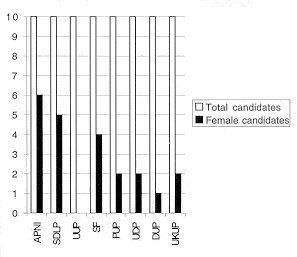
Are the leaders of the parties confident that such skills are
possessed by women within or outside their organisation? Remarks
by several key members of the parties on RTE's Prime Time[2]
are instructive in this regard.
Peter Robinson of the DUP readily defined the position of women
in the region: "The Ulster woman in the past has seen herself
very much as being in support of her man." He continued:
"No doors have been closed to women. As far as my party is
concerned, the door is always open and we encourage women to come
forward."
The DUP stood only eight women out of 54 candidates in the May
election. In ten constituencies it did not run any women. Only
two women were ranked number one in the constituencies; the highest
female position on the regional list was eighth. It is difficult
not to conclude that the mechanisms for encouraging women to stand
were not deployed or did not produce Mr Robinson's desired result.
His desired result was certainly the defence of the Northern Ireland
constitution, and he challenged the credibility of those women
who ran as members of the newly-formed Northern Ireland Women's
Coalition: "As far as those individuals that I have seen
with the Women's Coalition [are concerned], they haven't been
at the forefront of the battle when shots were being fired or
when the constitution of Northern Ireland was in peril. They are
not representative of the decent Ulster women that I speak to."
David Ervine of the PUP took a slightly different tack, acknowledging
the capacity of women to run an election campaign, but also calling
into question their ability to analyse and devise strategies to
accommodate difference: "I do have some dubious thoughts
about how they as a cross-community group can look at this election
and understand why this election is called and then field candidates
to actually deal with the problems that undoubtedly beset us."
He did go on to say that he was pleased that women were taking
the initiative, indeed expressing empathy in terms of how alienated
he felt himself to be from Northern Ireland politics. But he failed
to locate any responsibility for this in either his current position
or in earlier cultures of machismo with which he had been
involved: "I'm sure, like me, they [the NIWC] feel to a degree
alienated, they feel to a degree upset and disturbed by the fact
that our politicians have failed us so miserably in the past.
I haven't had an argument with that other than to say 'what can
I do about it?"'
For the SDLP, Seamus Mallon too queried the rationale of the Women's
Coalition. Without a hint of irony, he offered his analysis of
"single-issue" platforms thus: "And I hope it [the
NIWC] isn't damaged by making it almost a cult factor in Northern
Ireland politics, because once it becomes a cult factor, then
it starts to become single-issue, then once it starts to become
single-issue, it grows in on itself, and doesn't expand and kills
itself off."
He went on to display thinking informed very much by a sugar 'n'
spice and snails 'n' puppy-dog tails dichotomy The women involved
in the coalition, and by extension his own party, would not be
"tough enough" for the negotiations:
This won't be about setting differences aside, this will
be facing differences that we have in this community, facing them
full-frontal and dealing with those differences. What we must
realise is that these negotiations which are going to take place
are going to be very hard-nosed and they are going to be real
and it's going to be down to political judgment in terms of the
Ulster Unionist Party, the SDLP, Sinn Féin - and I hope
they will be there-and the DUP. That is what it's going to be
down to. And the real weight of political opinion will be shown
through those political parties and I hope that weight is shaped
by women within those parties.
So, the coalition women were playing at politics, and women could
only shape political opinion if they were assisted by and operated
within the parties. Maria Carragher, commenting for SF, offered
an assessment, which, while still questioning the potential impact
of the NIWC, did not seek to deride it on gender grounds: "Well
I don't think they are going to make any real impact on the vote
as a whole, seeing as they are a newly organised party, are not
very well established and people don't know what their agenda
is. I don't believe they will affect it that much at all."
Figure 4: gender breakdown of candidates ranked no 1 by parties
in constituencies
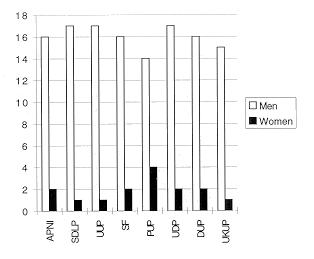
More striking evidence of these attitudes and policies is demonstrated
by an examination of how many women candidates stood for parties
in the recent election, and where they ranked (Figs 2, 3 and 4).
The election results merely affirm this norm. Out of some 110
members elected to the forum, only 15 (13.6 per cent) were women-comparable
to the proportion (11.5 per cent) which women members of district
councils currently comprise. The adage 'power is where women are
not'[3] holds true. As one gets closer to seats of
power - the negotiations and committees - the paucity of women
becomes more and more stark. Obviously one cannot predict the
manner in which SF will deploy its elected women, but none of
the other parties present have been represented by women at the
table.
Such is women's relationship to formal
politics in Northern Ireland. In an international context there
is nothing hugely unusual in there being an imbalance in 'national'
parliaments. In 1989, women constituted 12.7 per cent of the world's
single or popular chambers; indeed, by 1991, this had fallen to
11 per cent.[4] In the UK, women make up 9.2 per cent
of MPs,[5] while 12 per cent[6] of members
of Dáil Eireann are female.[7] The most proximate
UK region, Scotland, musters seven women MPs - 9.7 per cent.[8]
Northern Ireland has none.
While the constitutional legitimacy of elected bodies in Northern
Ireland may be disputed, that should not, of itself, be a barrier
to women's participation in elections to them. Clearly though,
the attitudes - explicit or latent - in the minds of Northern
Ireland's elected politicians are.[9]
Footnotes
| 1 | See Robert Miller, Rick Wilford and Freda Donoghue, Women and Political Participation in Northern Ireland, Avebury, Aldershot, 1996, p14. The founding purpose of the Ulster Women's Unionist Council, established in 1911, was the maintenance of the union, to which "all other questions in which individual members may be specially interested shall be subordinated". At the time the special interest was female suffrage; it was made very clear, therefore, that the union was of primary importance.
|
| 2 | May 23rd 1996
|
| 3 | E Vallance, 'Where Power Is, Women Are Not', Parliamentary Affairs, vol 35, spring 1982, pp 2 18-9, cited in Miller et al, op cit
|
| 4 | cited in Women's Communication Centre, Values and Visions: The Report from the What Women Want Social Survey, London, 1996, p16
|
| 5 | United Nations Fourth World Conference on Women: National Report of the United Kingdom, London, 1994
|
| 6 | United Nations Fourth World Conference on Women: National Report of Ireland, Dublin, 1994
|
| 7 | These participation levels have been steadily increasing. In the UK, the percentage of women in parliament in 1983 was 3.5, in 1987 6.3 and 1992 9.2. In the republic, the percentage was 6.6 in 1981, dipped to 4.8 in February 1982, and increased subsequently as follows: November 1982 8A, 1987 8.4, 1992 12.
|
| 8 | Engender, Gender Audit 1995: Putting Scottish Women in the Picture, Edinburgh, 1995
|
| 9 | Miller et al demonstrate that there is a gap between the mindset displayed by the politicians in the above-reported interviews and public attitudes towards women dealing with politics. In general, the public identified and recognised skills they perceived women to have which would be beneficial to public life, and were in favour of more women being involved in politics. See Rick Wilford's chapter in this report.
|
[Report Contents] [List of Reports]

Democratic Dialogue {external_link}
53 University Street, Belfast, BT7 1FY Northern
Ireland
Phone: -44-28-9022-0050 Fax: -44-28-9022-0051
E-mail: info@democraticdialogue.org
Back to the top of this page
|









